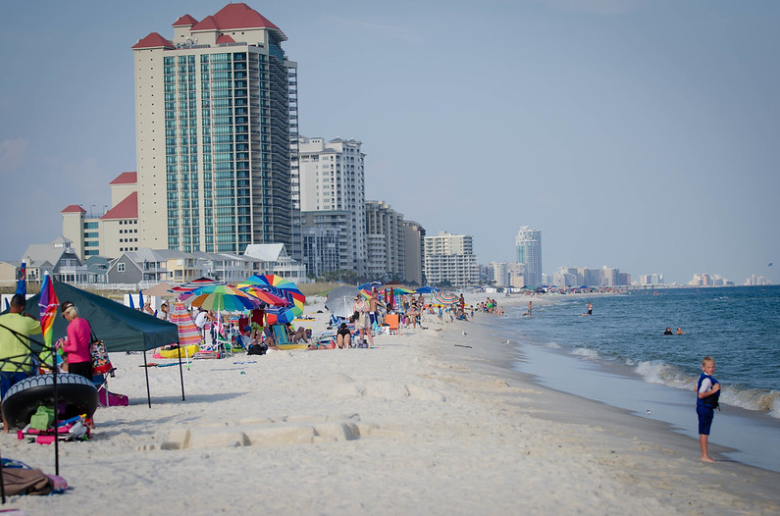Each year Alabama’s Department of Tourism reports on the economic impact of travel-related spending in the state, which in 2022 constituted almost 10% of our economy. The report allows consideration of the relationship between tourism and prosperity.
Let’s start with the numbers. Tourism spending in 2022 was $22 billion, up 5.4 percent when adjusted for inflation, with 28.6 million visitors and an associated 240,000 jobs. Perhaps most significantly for residents not in the industry, tourism generated $1.3 billion in state and local tax revenue.
Various methods generate these numbers, and as an economist, I could take issue with several. The jobs figure, for instance, is based on a spending multiplier, and impact studies notoriously use high multipliers. The proportion of expenditure by out-of-state visitors is not clearly discussed. But I wish to discuss the big picture, not quibble over numbers.
The report’s unstated implication is that tourism could drive a good portion of Alabama’s economy, a view often promoted by industry boosters. I think they are mistaken.
Tourism is a form of consumer spending and occurs because of productive economic activity, thus, a family can afford a vacation after earning enough money to pay their bills. A prosperous economy will support considerable tourism, but tourism does not create prosperity.
Confusion exists even among economists on this point, thanks to the role of consumption in the Keynesian model. Many regional economic models used in tourism are consumption-based, contributing to the appearance that tourism can spur prosperity.
Tourism can sustain some communities within a productive economy – think Key West in honor of Jimmy Buffet. And vacation spending supports jobs in tourist destinations.
However many vacation options exist, so Alabama’s tourism industry must create value to contribute to the economy and attract paying visitors (given all the other options available). Tourism is no different from manufacturing, banking, or movie-making in this regard.
Value creation establishes a limit to government intervention to boost tourism. To take an extreme example, suppose the state builds a new resort and pays guests’ entire bills to ensure full capacity. Jobs will be filled serving the visitors, but this does not boost Alabama’s economy; we just spend our tax dollars here.
Economics can explain why travel-related businesses push for governments to hold events attracting visitors. The investment to build a resort is irreversible; economists call this specific investment. The concrete, steel, and lumber cannot be used to construct something else, and the resort cannot be moved. The resort would not be built if investors did not think tourists would visit. But forecasts do not guarantee paying customers. Government-sponsored festivals help fill rooms.
Tourism tax revenue involves more economics. Economists analyze who pays taxes through careful comparison of prices with and without the taxes. Consumers will pay at least some hotel or rental car taxes, so out-of-state residents will pay a portion of tourism taxes. Some politicians, however, pitch tourism taxes as yielding free money. But Alabama residents and local businesses also pay a portion of tourism taxes. And other states try to get free money too, leading to excessive travel taxes.
Should our state invest tax dollars in developing tourism and outdoor recreation, as the recent Innovative Alabama report suggests? I remember Michigan leaders’ grand vision for a destination theme park: Auto World. Politicians are poor at divining which businesses or tourist attractions will draw paying customers. We should welcome entrepreneurs willing to invest their own money in tourism. Our governments can assist by not burdening private investors with excessive taxation and regulation.
Casinos are one tourism business Alabama prohibits. Leaving aside the morality of gambling, I’ll instead recognize that Mobile would be a more attractive convention destination with casinos. Thus, the state has a self-imposed disadvantage in attracting the millions of Americans who gamble responsibly.
Tourism is an important part of a prosperous economy. Value-creating tourist destinations improve Alabama’s economy – and our lives. However subsidizing tourism with tax dollars will not create prosperity.
Daniel Sutter is the Charles G. Koch Professor of Economics with the Manuel H. Johnson Center for Political Economy at Troy University and host of Econversations on TrojanVision. The opinions expressed in this column are the author’s and do not necessarily reflect the views of Troy University.
The views and opinions expressed here are those of the author and do not necessarily reflect the policy or position of 1819 News.
Don't miss out! Subscribe to our newsletter and get our top stories every weekday morning.










